 . . . THE CBZ JOURNAL
. . . THE CBZ JOURNALTable of Contents
 . . . THE CBZ JOURNAL
. . . THE CBZ JOURNAL |
April 2001 Table of Contents |
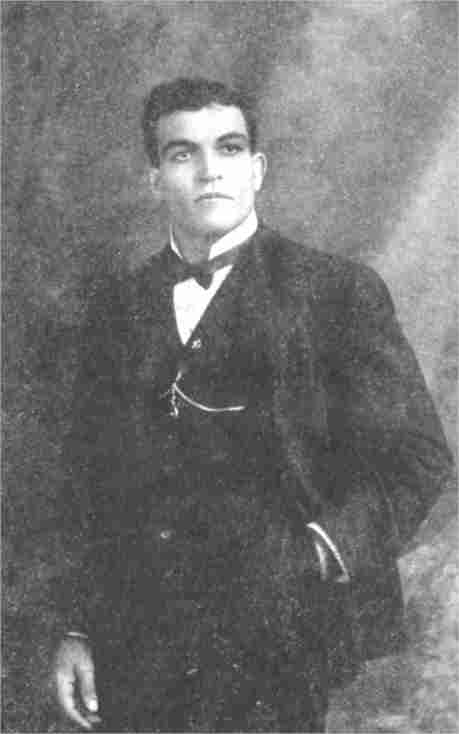 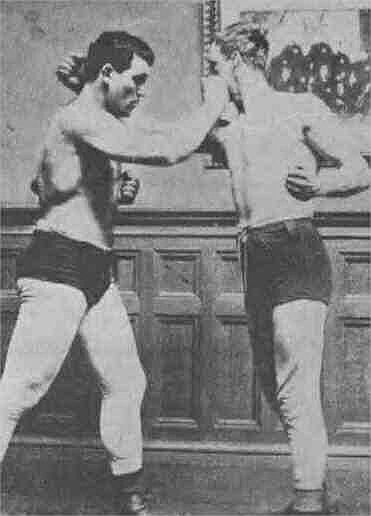 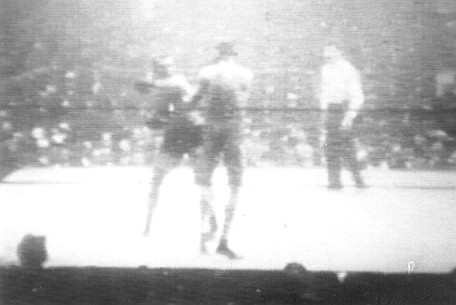 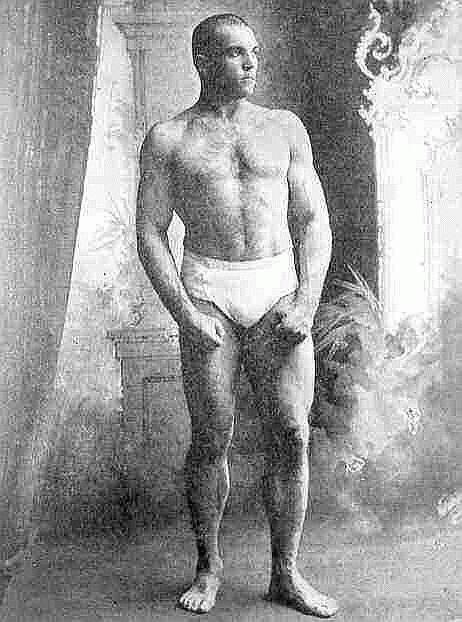 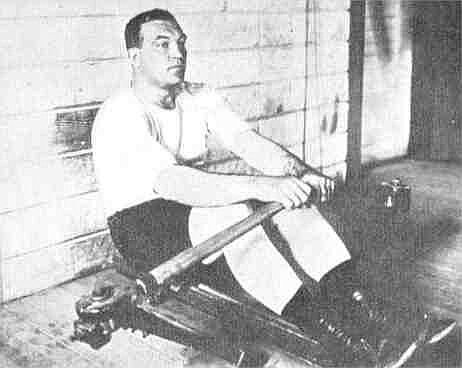 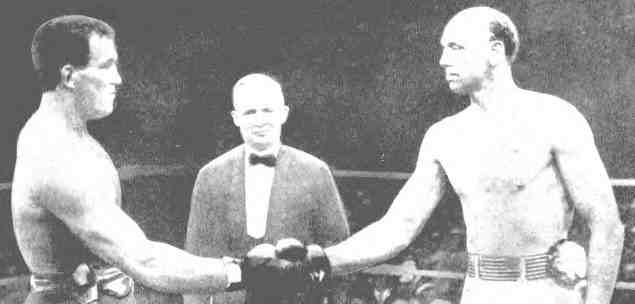 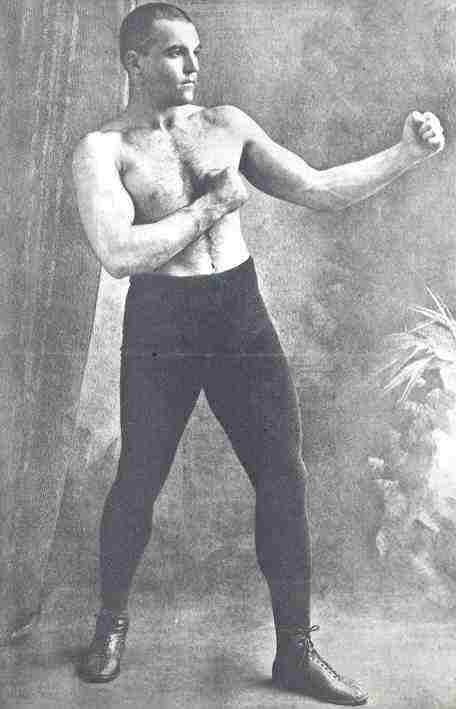 |
JIM JEFFRIES ... "WARHORSE OF YESTERYEAR" By Tracy Callis Jim Jeffries was the "Champion of the Old Guard", the strong man from the school of brute strength. He was a self-punishing fighter in training, thriving on hard work, who stepped up the pace as a fight wore on and seemed to get stronger with each passing round. Jeffries preferred to bide his time and pound out a deliberate win but fought harder when challenged to mix it up. The rougher it got, the rougher he got. He fought from a crouch, leading with his left. In this position, he was somewhat difficult to hit and impossible to hurt. He resembled a bear as he ambled towards his opponent. An awesome left-hand hitter, he was able to deliver knockout punches or telltale blows from a short distance rather quickly. He was massive in size with large arms, shoulders, neck, head, and legs. But, at the same time, he was sinewy, shapely, and muscular. In spite of his huge size, he moved on springy, bouncy legs. He could run 100 yards in a little over ten seconds and high jump over six feet. John L. Sullivan called him "the fastest big man I ever saw in the ring" (see Willoughby 1970 p 362). Old-time referee Billy Roche described Jeffries as having the "acrobatic springiness of a circus tumbler in his legs. He was no lumbering ox, anchored to one spot, but a natural athlete" (see McCallum 1975 p 11). Surly in nature and stubborn, he did not care much for foolishness or jokes. He was often referred to as the "Beast" because of his rough battle tactics. Fighting from his crouch, he would suddenly spring forward, often clanging heads with his foe (this never hurt Jeffries but often stunned his man). Butting heads, ramming shoulders into opponents, hitting with elbows, shoving his foe around, and leaning on his man in clinches were all part of his style. William Brady, who managed both Jeffries and Jim Corbett, remarked, "There never was a man better fitted anatomically, physically, and temperamentally for the role of World's Heavyweight Champion" (see Edgren 1926). Testimonies to Jeffries' strength are numerous. Houston (1975 p 15) said, "There was nothing fancy about James J. Jeffries. He was a die-hard fighter of the old school, relying on his considerable strength and durability to bring him victory." He added that Jeffries had a "bear-like" appearance in his slightly crouched stance, was almost impossible to hurt or discourage, and delivered clubbing blows that took their toll. He also said "If Jeffries could not outbox an opponent, he could certainly outlast the best of them." Odd (1974 p 18) said that Jeffries was the strongest of the heavyweight champions in both hitting power and build. Carpenter (1975 p 34) called Jeffries a bull of a man out of the California iron foundries who traded on strength. It has been written that no man was the same after being pounded by Jeffries' fists. With "TNT" in each hand, he delivered heavy, relentless blows that imparted their damage to the foe. He cracked two of Bob Fitzsimmons' ribs in one of their bouts. He battered Tom Sharkey, breaking his nose and two ribs. Diamond (1954 p 62) said Sharkey was hospitalized for three days and suffered three broken ribs. He bashed in Jim Corbett's right side in their second match. He sent Joe Goddard to the hospital with a severe beating and dealt Pete Everett head and back injuries that kept him bed-ridden for days. Yet, Jeffries, himself, said he never hit a man with all his strength for fear of killing him. Grombach (1977 p 50) said Jeffries was a natural puncher who was so big and powerful that he could deliver damaging blows from an almost extended left-hand that did not have to travel more than a few inches. Keith (1969 p 127) asserted, "Jeffries probably owned the deadliest left hook the prize ring has ever known." Tex Rickard, famed fight promoter, said "There's no style to him, but he's the hardest hitter I ever saw. And that includes Dempsey" (see McCallum 1975 p 15; Durant 1976 p 47). Diamond (1954 p 60) described Jeffries, "he was something more than a mere slugger. He was a rough, tough battler, with a mighty punch." Sports columnist Ned Brown, said, "He was one of the most powerfully built, could take a solid punch, and had acquired a fair amount of boxing skill by the time he tangled with Jim Corbett in their second match. Jeff had as deadly wallop as any I've ever seen" (see McCallum 1975 p 12). Odd (1976 p 163) quoted Fitzsimmons describing Jeffries in battle, "The first time he really hit me in the body, I thought his fist had gone right through me. His crouching stance and the way he tossed that long left. Every time I hit him, he punched back even harder." Cooper (1978 p 107) remarked, "James J. Jeffries was one of the ring's indestructibles" and asserted, "Apart from having a punch that might have knocked a horse out, Jeffries' greatest asset was sheer patience." It has been said that Jeffries could endure more punishment than any other prizefighter. He had a cast iron chin attached to a large, bowling ball head. Fight fans in New York called him a "primitive", a "caveman". He was never knocked down during his prime. Willoughby (1970 p 358) wrote, "Certainly, among all the heavyweights up to the year 1905, when he retired from the ring, Jim Jeffries was the greatest all-around performer. While he could not hit with the lightning-speed of Fitzsimmons, he had a powerful punch in each hand, and a good defense in the form of his famous 'crouch'. Most of all, however, he was impervious to blows, either to his head, face, or body." According to Farr (1964 p 34), "Jim Jeffries was tough. Let us examine the word. Since Jeffries' time, it has suffered such abuse as a vogue-word as to be almost without meaning ... But, at the time the word was applied to Jeffries, it had a meaning that was both broad and exact. A tough man's bone structure was heavier than that of a ordinary person; his muscular integument was thicker, so that it protected his nervous system from shock, and also was more supple, thus giving him superior ease and freedom of movement. He had a higher threshold of pain than the average man, and so could take a punch, as the handlers of prizefighters put it. The completing element of toughness, however, was emotional, and it lay in willingness to hit or kick another man, or maim him, before he could go into action." Suster (1994 p 31) reported, "Certainly he was tough. Possibly no heavyweight champion has ever demonstrated a greater capacity for enduring pain." Lardner (1972 p 135) said, "Jeffries, far from a natural boxer, picked up the rawest fundamentals. But, given Jeffries' extraordinary physical skills, fundamentals were enough." He added, "nature had furnished him with nearly impenetrable armour." Bob Fitzsimmons, one of the ring's deadliest hitters, broke his fists on Jeffries' head. Fitz even used plaster of paris in his wraps and still couldn't knock Jeffries down. Jim Corbett said, "Nobody can ever hurt him, not even with an ax" (see Litsky 1975 p 166). Gene Tunney (1941 p 139) wrote, "Jeffries' decisive quality was his tremendous physical toughness and endurance. The brawny giant could hardly be hurt" (also see McCallum 1974 p 49). W.W. Naughton (1902 p 122) recorded, "To sum up his qualities of ringmanship, it may be said that he is fairly talented in every branch of self-defense. He boxes cleverly, defends himself well and strikes a hard blow. But, back of all these are the qualities which have made him a champion, to wit, magnificent strength and wonderful endurance." Durant and Bettmann (1952 p 122) state that Jeffries was a fighting champion, putting his title on the line to anyone who deserved a crack at it. All the good men he fought prior to becoming champion received a title shot. Edgren (1926 p 56) said he even offered to fight Fitzsimmons, Corbett, and Sharkey - all on the same night - but they refused. Jess Willard said, "Jim Jeffries was a great, big, rugged fella, hard t'beat." He added, "Very tough man ... Jeffries in his prime would lick anybody - he did!" (see Suster 1994 p 31). Tom Sharkey asserted "Jeffries would have licked Jack Dempsey and Joe Louis on the same night. He was strong as a bull and quick on his feet like a cat" (see Diamond 1954 p 62). McCallum (1974 p 47) described Jeffries as "big, strong and hard as granite" and said if he "wasn't the greatest heavyweight who ever fought certainly he stands out as one of the more formidable." High Fullerton (1929, Foreword) wrote, "James J. Jeffries was the greatest heavyweight fighter in the history of the ring. A huge, hairy mountain of a man, fast with the deceptive speed of a grizzly, seemingly stolid, almost sullen, he was the least known of the great champions - and the most misunderstood." John J. Romano (Everlast 1931 p 93) wrote, "Jeff is sometimes referred to as the greatest of them all, and his record certainly justifies the title." Dan Morgan, fighter and manager for over forty years, called Jeffries his "Champion of Champions", and firmly believed Jeff would whip all the others (see McCallum 1975 pp 11 12). In a survey of a number of old-timers, conducted by John McCallum, Jeffries was ranked as the #1 All-Time Heavyweight (see McCallum 1975 p 322). Nat Fleischer ranked Jim as the #2 All-Time Heavyweight. Charley Rose ranked him as #4. In the opinion of this writer, Jeffries was the #1 Heavyweight of all time. References Carpenter, H. 1975. Boxing : A Pictorial History. Chicago: Henry Regnery Company. Cooper, H. 1978. The Great Heavyweights. Secaucus, NJ: Chartwell Books, Inc. Diamond, W. 1954. Kings of the Ring. London: The World's Work (1913) Ltd. Durant, J. 1976. The Heavyweight Champions. New York: Hastings House Publishers. Durant, J. and Bettmann, O. 1952. Pictorial History of American Sports. Cranbury, NJ: A.S. Barnes and Company. Edgren, R. 1926. "The Big Fellow" (Jim Jeffries) - a series contained in Liberty Magazine for seven weekly issues from July 31, 1926 to September 11, 1926. Farr, F. 1964. Black Champion (The Life and Times of Jack Johnson). New York: Charles Scribner's Sons. Fullerton, H. 1929. Two-Fisted Jeff. Chicago: Consolidated Book Publishers, Inc. Grombach, J. 1977. The Saga of the Fist. New York: A.S. Barnes and Company. Houston, G. 1975. SuperFists. New York: Bounty Books. Keith, H. 1969. Sports and Games. New York: Thomas Y. Crowell and Company Lardner, R. 1972. The Legendary Champions. New York: American Heritage Press Litsky, F. 1975. Superstars. Secaucus, New Jersey: Derbibooks Inc. McCallum, J. 1974. The World Heavyweight Boxing Championship. Radnor, Pa: Chilton Book Company. McCallum, J. 1975. The Encyclopedia of World Boxing Champions. Radnor, Pa: Chilton Book Company. Naughton, W. 1902. Kings Of The Queensberry Realm. Chicago: The Continental Publishing Company. Odd, G. 1974. Boxing : The Great Champions. London: The Hamlyn Publishing Group Limited. Odd. G., 1976. The Fighting Blacksmith. London: Pelham books, Ltd. Romano, J. 1931. Champions All. In Everlast Boxing Record, pp. 92-126 Suster, G. 1994. Champions of the Ring. London: Robson Books Ltd. Tunney, G. 1941. Arms For Living. New York: Wilfred Funk, Inc. Willoughby, D. 1970. The Super Athletes. Cranbury, New Jersey: A.S. Barnes and Co., Inc. According to Farr (1964 p 34), "Jim Jeffries was tough. Let us examine the word. Since Jeffries' time, it has suffered such abuse as a vogue-word as to be almost without meaning ... But, at the time the word was applied to Jeffries, it had a meaning that was both broad and exact. A tough man's bone structure was heavier than that of a ordinary person; ..... " The sentence (it's in the middle of the paragraph)--- A tough man's bone structure was heavier than that of a ordinary person Should read --- A tough man's bone structure was heavier than that of an ordinary person
|
Bob Fitsimmons Record Jim Jeffries Record Jack Johnson Record Tom Sharkey Record Tracy Callis Profiles Muhammad Ali Jim Corbett Jack Dempsey Nonpareil Jack Dempsey Bob Fitzsimmons Joe Frazier Larry Holmes Peter Jackson Jack Johnson Sam Langford Sonny Liston Joe Louis Rocky Marciano Kid McCoy Billy Miske Sailor Tom Sharkey John L. Sullivan Gene Tunney |
| Schedule | News | Current Champs | WAIL! | Encyclopedia | Links | Store | Home |